Group Report: Leadership Styles and Motivation Theories in NHS
VerifiedAdded on 2023/06/10
|13
|3246
|420
Report
AI Summary
This report investigates leadership and motivation within the NHS, a public enterprise, focusing on how these elements influence organizational performance. It examines leadership styles such as contingency, situational, and transformational leadership, alongside motivational theories lik...

CW1 Group Report
1
1
Paraphrase This Document
Need a fresh take? Get an instant paraphrase of this document with our AI Paraphraser
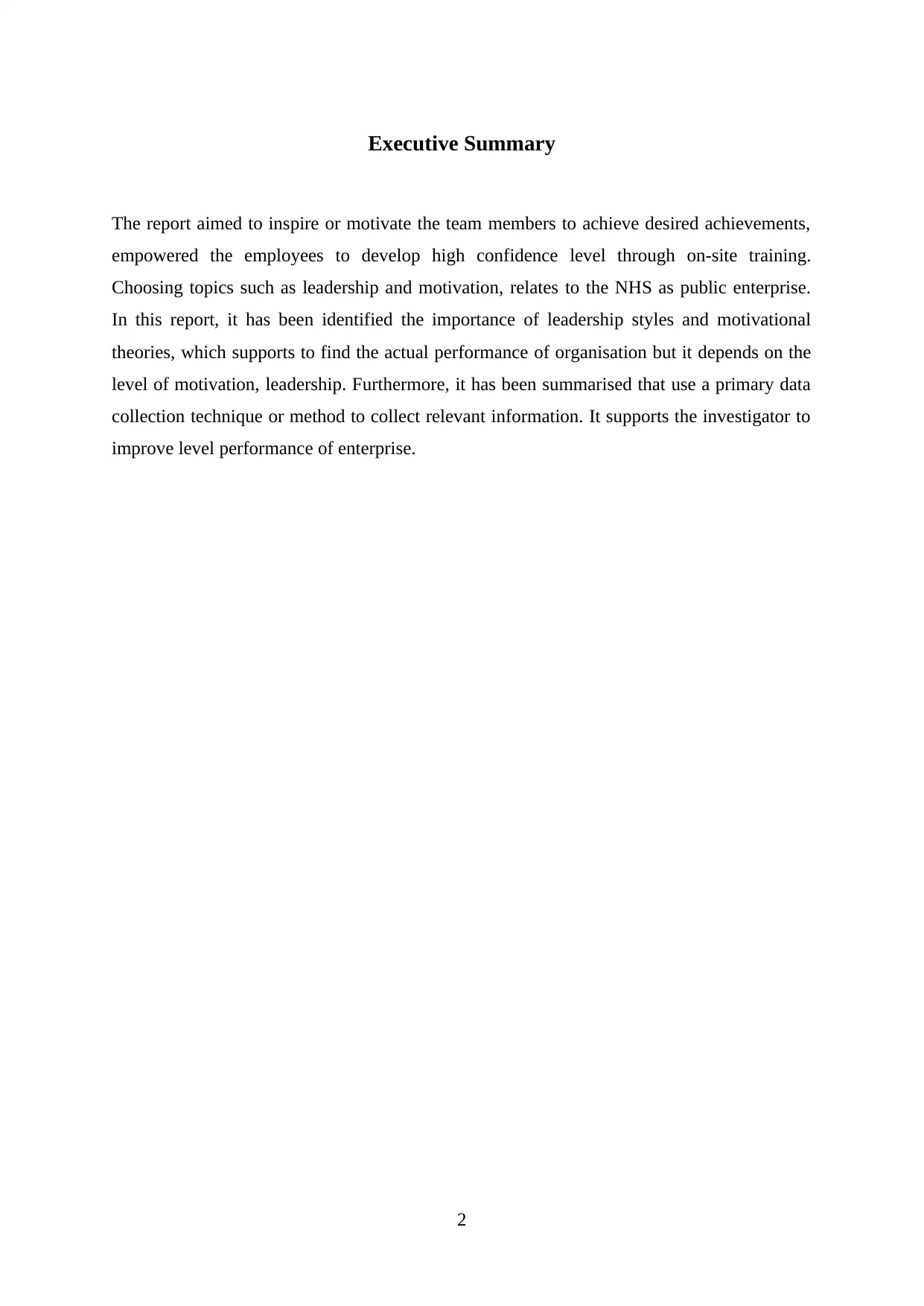
Executive Summary
The report aimed to inspire or motivate the team members to achieve desired achievements,
empowered the employees to develop high confidence level through on-site training.
Choosing topics such as leadership and motivation, relates to the NHS as public enterprise.
In this report, it has been identified the importance of leadership styles and motivational
theories, which supports to find the actual performance of organisation but it depends on the
level of motivation, leadership. Furthermore, it has been summarised that use a primary data
collection technique or method to collect relevant information. It supports the investigator to
improve level performance of enterprise.
2
The report aimed to inspire or motivate the team members to achieve desired achievements,
empowered the employees to develop high confidence level through on-site training.
Choosing topics such as leadership and motivation, relates to the NHS as public enterprise.
In this report, it has been identified the importance of leadership styles and motivational
theories, which supports to find the actual performance of organisation but it depends on the
level of motivation, leadership. Furthermore, it has been summarised that use a primary data
collection technique or method to collect relevant information. It supports the investigator to
improve level performance of enterprise.
2
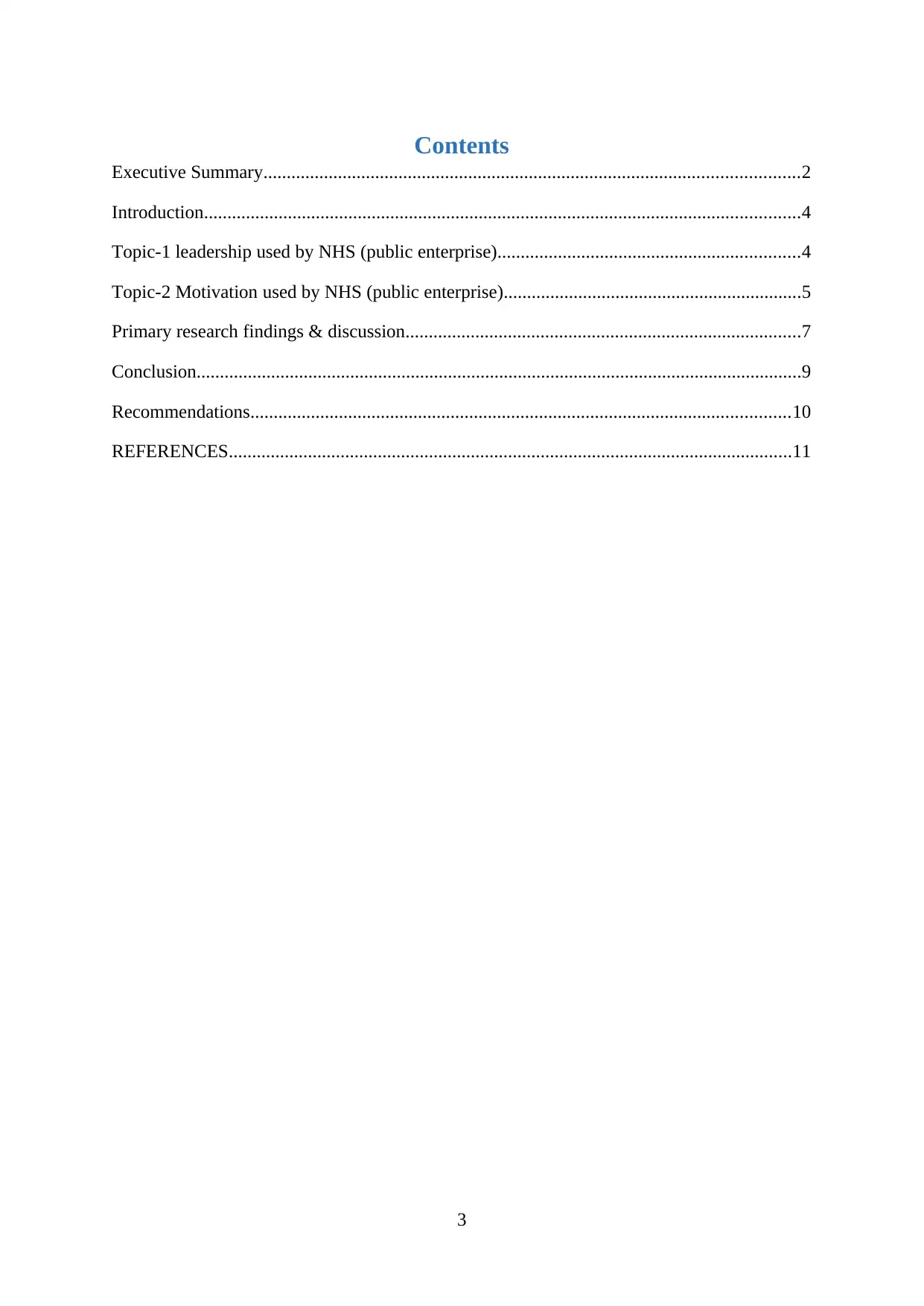
Contents
Executive Summary...................................................................................................................2
Introduction................................................................................................................................4
Topic-1 leadership used by NHS (public enterprise).................................................................4
Topic-2 Motivation used by NHS (public enterprise)................................................................5
Primary research findings & discussion.....................................................................................7
Conclusion..................................................................................................................................9
Recommendations....................................................................................................................10
REFERENCES.........................................................................................................................11
3
Executive Summary...................................................................................................................2
Introduction................................................................................................................................4
Topic-1 leadership used by NHS (public enterprise).................................................................4
Topic-2 Motivation used by NHS (public enterprise)................................................................5
Primary research findings & discussion.....................................................................................7
Conclusion..................................................................................................................................9
Recommendations....................................................................................................................10
REFERENCES.........................................................................................................................11
3
⊘ This is a preview!⊘
Do you want full access?
Subscribe today to unlock all pages.

Trusted by 1+ million students worldwide
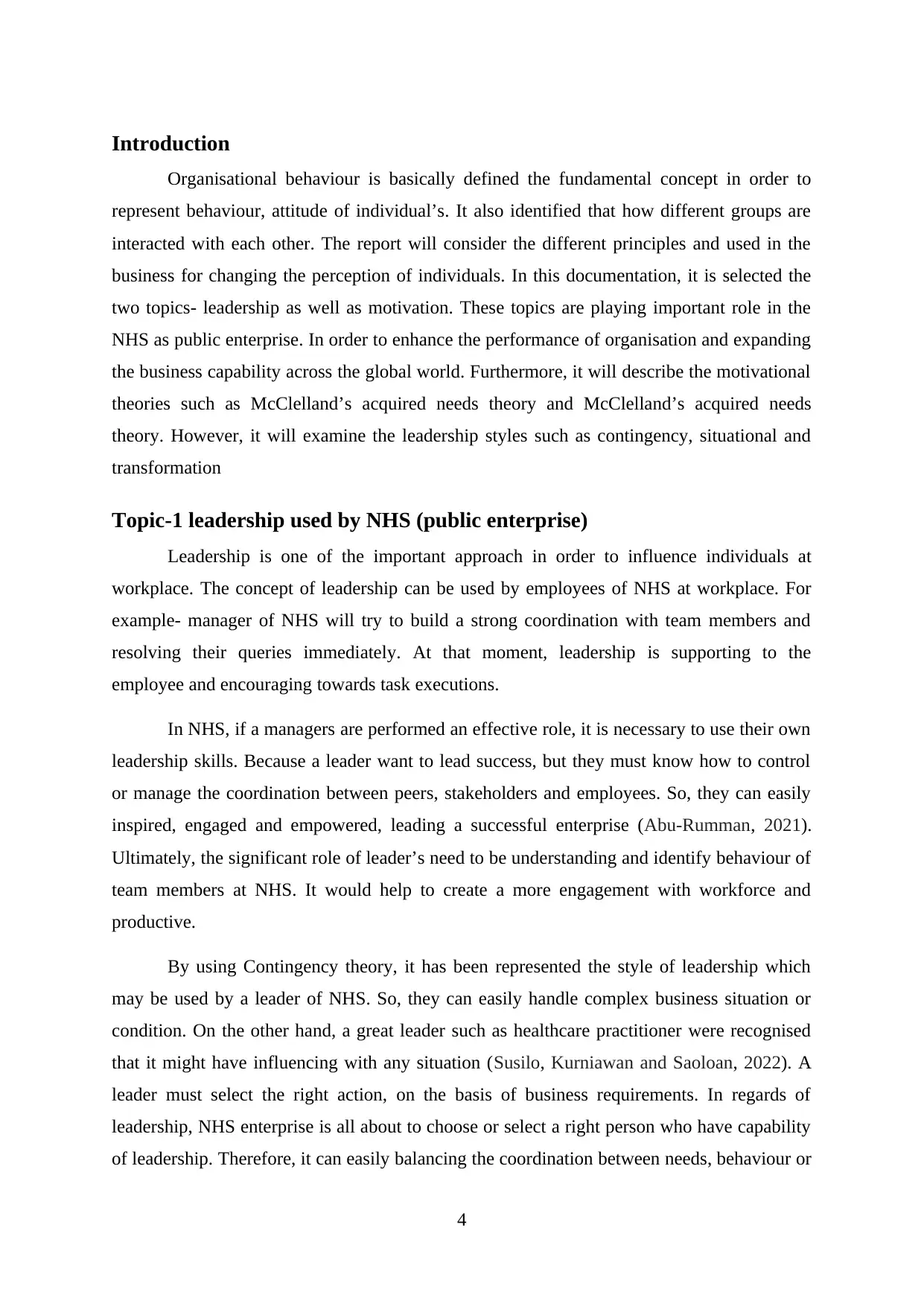
Introduction
Organisational behaviour is basically defined the fundamental concept in order to
represent behaviour, attitude of individual’s. It also identified that how different groups are
interacted with each other. The report will consider the different principles and used in the
business for changing the perception of individuals. In this documentation, it is selected the
two topics- leadership as well as motivation. These topics are playing important role in the
NHS as public enterprise. In order to enhance the performance of organisation and expanding
the business capability across the global world. Furthermore, it will describe the motivational
theories such as McClelland’s acquired needs theory and McClelland’s acquired needs
theory. However, it will examine the leadership styles such as contingency, situational and
transformation
Topic-1 leadership used by NHS (public enterprise)
Leadership is one of the important approach in order to influence individuals at
workplace. The concept of leadership can be used by employees of NHS at workplace. For
example- manager of NHS will try to build a strong coordination with team members and
resolving their queries immediately. At that moment, leadership is supporting to the
employee and encouraging towards task executions.
In NHS, if a managers are performed an effective role, it is necessary to use their own
leadership skills. Because a leader want to lead success, but they must know how to control
or manage the coordination between peers, stakeholders and employees. So, they can easily
inspired, engaged and empowered, leading a successful enterprise (Abu-Rumman, 2021).
Ultimately, the significant role of leader’s need to be understanding and identify behaviour of
team members at NHS. It would help to create a more engagement with workforce and
productive.
By using Contingency theory, it has been represented the style of leadership which
may be used by a leader of NHS. So, they can easily handle complex business situation or
condition. On the other hand, a great leader such as healthcare practitioner were recognised
that it might have influencing with any situation (Susilo, Kurniawan and Saoloan, 2022). A
leader must select the right action, on the basis of business requirements. In regards of
leadership, NHS enterprise is all about to choose or select a right person who have capability
of leadership. Therefore, it can easily balancing the coordination between needs, behaviour or
4
Organisational behaviour is basically defined the fundamental concept in order to
represent behaviour, attitude of individual’s. It also identified that how different groups are
interacted with each other. The report will consider the different principles and used in the
business for changing the perception of individuals. In this documentation, it is selected the
two topics- leadership as well as motivation. These topics are playing important role in the
NHS as public enterprise. In order to enhance the performance of organisation and expanding
the business capability across the global world. Furthermore, it will describe the motivational
theories such as McClelland’s acquired needs theory and McClelland’s acquired needs
theory. However, it will examine the leadership styles such as contingency, situational and
transformation
Topic-1 leadership used by NHS (public enterprise)
Leadership is one of the important approach in order to influence individuals at
workplace. The concept of leadership can be used by employees of NHS at workplace. For
example- manager of NHS will try to build a strong coordination with team members and
resolving their queries immediately. At that moment, leadership is supporting to the
employee and encouraging towards task executions.
In NHS, if a managers are performed an effective role, it is necessary to use their own
leadership skills. Because a leader want to lead success, but they must know how to control
or manage the coordination between peers, stakeholders and employees. So, they can easily
inspired, engaged and empowered, leading a successful enterprise (Abu-Rumman, 2021).
Ultimately, the significant role of leader’s need to be understanding and identify behaviour of
team members at NHS. It would help to create a more engagement with workforce and
productive.
By using Contingency theory, it has been represented the style of leadership which
may be used by a leader of NHS. So, they can easily handle complex business situation or
condition. On the other hand, a great leader such as healthcare practitioner were recognised
that it might have influencing with any situation (Susilo, Kurniawan and Saoloan, 2022). A
leader must select the right action, on the basis of business requirements. In regards of
leadership, NHS enterprise is all about to choose or select a right person who have capability
of leadership. Therefore, it can easily balancing the coordination between needs, behaviour or
4
Paraphrase This Document
Need a fresh take? Get an instant paraphrase of this document with our AI Paraphraser
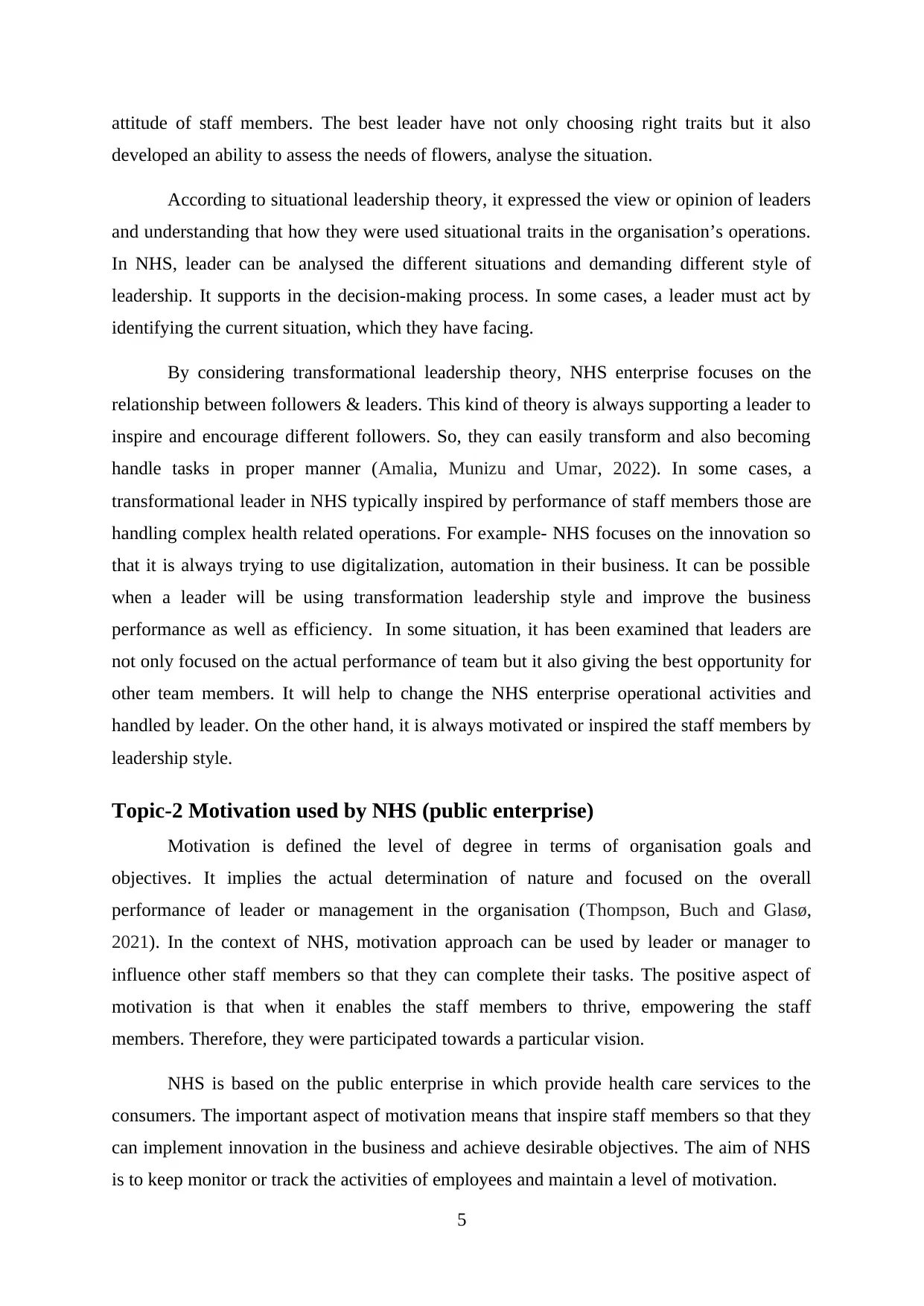
attitude of staff members. The best leader have not only choosing right traits but it also
developed an ability to assess the needs of flowers, analyse the situation.
According to situational leadership theory, it expressed the view or opinion of leaders
and understanding that how they were used situational traits in the organisation’s operations.
In NHS, leader can be analysed the different situations and demanding different style of
leadership. It supports in the decision-making process. In some cases, a leader must act by
identifying the current situation, which they have facing.
By considering transformational leadership theory, NHS enterprise focuses on the
relationship between followers & leaders. This kind of theory is always supporting a leader to
inspire and encourage different followers. So, they can easily transform and also becoming
handle tasks in proper manner (Amalia, Munizu and Umar, 2022). In some cases, a
transformational leader in NHS typically inspired by performance of staff members those are
handling complex health related operations. For example- NHS focuses on the innovation so
that it is always trying to use digitalization, automation in their business. It can be possible
when a leader will be using transformation leadership style and improve the business
performance as well as efficiency. In some situation, it has been examined that leaders are
not only focused on the actual performance of team but it also giving the best opportunity for
other team members. It will help to change the NHS enterprise operational activities and
handled by leader. On the other hand, it is always motivated or inspired the staff members by
leadership style.
Topic-2 Motivation used by NHS (public enterprise)
Motivation is defined the level of degree in terms of organisation goals and
objectives. It implies the actual determination of nature and focused on the overall
performance of leader or management in the organisation (Thompson, Buch and Glasø,
2021). In the context of NHS, motivation approach can be used by leader or manager to
influence other staff members so that they can complete their tasks. The positive aspect of
motivation is that when it enables the staff members to thrive, empowering the staff
members. Therefore, they were participated towards a particular vision.
NHS is based on the public enterprise in which provide health care services to the
consumers. The important aspect of motivation means that inspire staff members so that they
can implement innovation in the business and achieve desirable objectives. The aim of NHS
is to keep monitor or track the activities of employees and maintain a level of motivation.
5
developed an ability to assess the needs of flowers, analyse the situation.
According to situational leadership theory, it expressed the view or opinion of leaders
and understanding that how they were used situational traits in the organisation’s operations.
In NHS, leader can be analysed the different situations and demanding different style of
leadership. It supports in the decision-making process. In some cases, a leader must act by
identifying the current situation, which they have facing.
By considering transformational leadership theory, NHS enterprise focuses on the
relationship between followers & leaders. This kind of theory is always supporting a leader to
inspire and encourage different followers. So, they can easily transform and also becoming
handle tasks in proper manner (Amalia, Munizu and Umar, 2022). In some cases, a
transformational leader in NHS typically inspired by performance of staff members those are
handling complex health related operations. For example- NHS focuses on the innovation so
that it is always trying to use digitalization, automation in their business. It can be possible
when a leader will be using transformation leadership style and improve the business
performance as well as efficiency. In some situation, it has been examined that leaders are
not only focused on the actual performance of team but it also giving the best opportunity for
other team members. It will help to change the NHS enterprise operational activities and
handled by leader. On the other hand, it is always motivated or inspired the staff members by
leadership style.
Topic-2 Motivation used by NHS (public enterprise)
Motivation is defined the level of degree in terms of organisation goals and
objectives. It implies the actual determination of nature and focused on the overall
performance of leader or management in the organisation (Thompson, Buch and Glasø,
2021). In the context of NHS, motivation approach can be used by leader or manager to
influence other staff members so that they can complete their tasks. The positive aspect of
motivation is that when it enables the staff members to thrive, empowering the staff
members. Therefore, they were participated towards a particular vision.
NHS is based on the public enterprise in which provide health care services to the
consumers. The important aspect of motivation means that inspire staff members so that they
can implement innovation in the business and achieve desirable objectives. The aim of NHS
is to keep monitor or track the activities of employees and maintain a level of motivation.
5
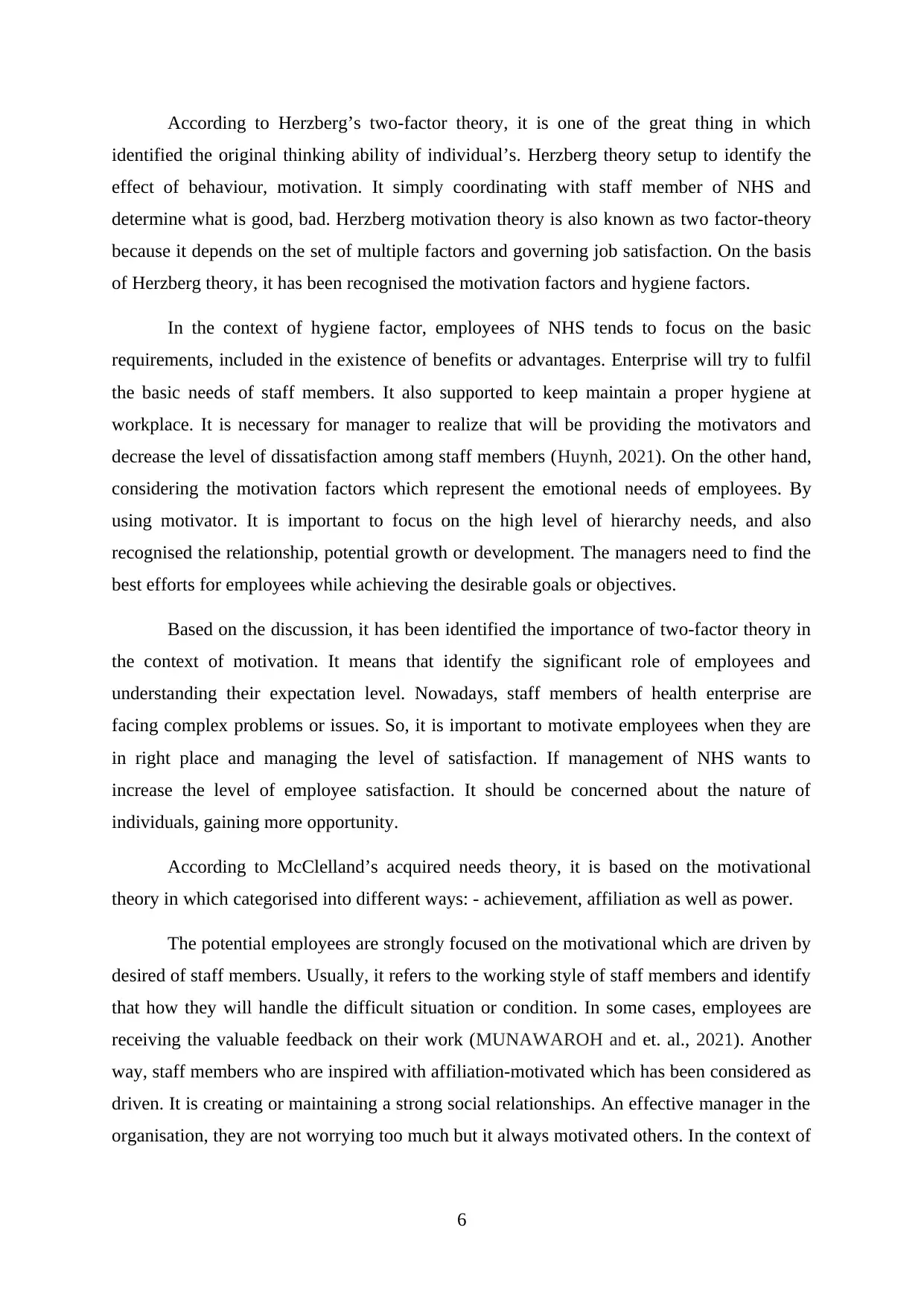
According to Herzberg’s two-factor theory, it is one of the great thing in which
identified the original thinking ability of individual’s. Herzberg theory setup to identify the
effect of behaviour, motivation. It simply coordinating with staff member of NHS and
determine what is good, bad. Herzberg motivation theory is also known as two factor-theory
because it depends on the set of multiple factors and governing job satisfaction. On the basis
of Herzberg theory, it has been recognised the motivation factors and hygiene factors.
In the context of hygiene factor, employees of NHS tends to focus on the basic
requirements, included in the existence of benefits or advantages. Enterprise will try to fulfil
the basic needs of staff members. It also supported to keep maintain a proper hygiene at
workplace. It is necessary for manager to realize that will be providing the motivators and
decrease the level of dissatisfaction among staff members (Huynh, 2021). On the other hand,
considering the motivation factors which represent the emotional needs of employees. By
using motivator. It is important to focus on the high level of hierarchy needs, and also
recognised the relationship, potential growth or development. The managers need to find the
best efforts for employees while achieving the desirable goals or objectives.
Based on the discussion, it has been identified the importance of two-factor theory in
the context of motivation. It means that identify the significant role of employees and
understanding their expectation level. Nowadays, staff members of health enterprise are
facing complex problems or issues. So, it is important to motivate employees when they are
in right place and managing the level of satisfaction. If management of NHS wants to
increase the level of employee satisfaction. It should be concerned about the nature of
individuals, gaining more opportunity.
According to McClelland’s acquired needs theory, it is based on the motivational
theory in which categorised into different ways: - achievement, affiliation as well as power.
The potential employees are strongly focused on the motivational which are driven by
desired of staff members. Usually, it refers to the working style of staff members and identify
that how they will handle the difficult situation or condition. In some cases, employees are
receiving the valuable feedback on their work (MUNAWAROH and et. al., 2021). Another
way, staff members who are inspired with affiliation-motivated which has been considered as
driven. It is creating or maintaining a strong social relationships. An effective manager in the
organisation, they are not worrying too much but it always motivated others. In the context of
6
identified the original thinking ability of individual’s. Herzberg theory setup to identify the
effect of behaviour, motivation. It simply coordinating with staff member of NHS and
determine what is good, bad. Herzberg motivation theory is also known as two factor-theory
because it depends on the set of multiple factors and governing job satisfaction. On the basis
of Herzberg theory, it has been recognised the motivation factors and hygiene factors.
In the context of hygiene factor, employees of NHS tends to focus on the basic
requirements, included in the existence of benefits or advantages. Enterprise will try to fulfil
the basic needs of staff members. It also supported to keep maintain a proper hygiene at
workplace. It is necessary for manager to realize that will be providing the motivators and
decrease the level of dissatisfaction among staff members (Huynh, 2021). On the other hand,
considering the motivation factors which represent the emotional needs of employees. By
using motivator. It is important to focus on the high level of hierarchy needs, and also
recognised the relationship, potential growth or development. The managers need to find the
best efforts for employees while achieving the desirable goals or objectives.
Based on the discussion, it has been identified the importance of two-factor theory in
the context of motivation. It means that identify the significant role of employees and
understanding their expectation level. Nowadays, staff members of health enterprise are
facing complex problems or issues. So, it is important to motivate employees when they are
in right place and managing the level of satisfaction. If management of NHS wants to
increase the level of employee satisfaction. It should be concerned about the nature of
individuals, gaining more opportunity.
According to McClelland’s acquired needs theory, it is based on the motivational
theory in which categorised into different ways: - achievement, affiliation as well as power.
The potential employees are strongly focused on the motivational which are driven by
desired of staff members. Usually, it refers to the working style of staff members and identify
that how they will handle the difficult situation or condition. In some cases, employees are
receiving the valuable feedback on their work (MUNAWAROH and et. al., 2021). Another
way, staff members who are inspired with affiliation-motivated which has been considered as
driven. It is creating or maintaining a strong social relationships. An effective manager in the
organisation, they are not worrying too much but it always motivated others. In the context of
6
⊘ This is a preview!⊘
Do you want full access?
Subscribe today to unlock all pages.

Trusted by 1+ million students worldwide
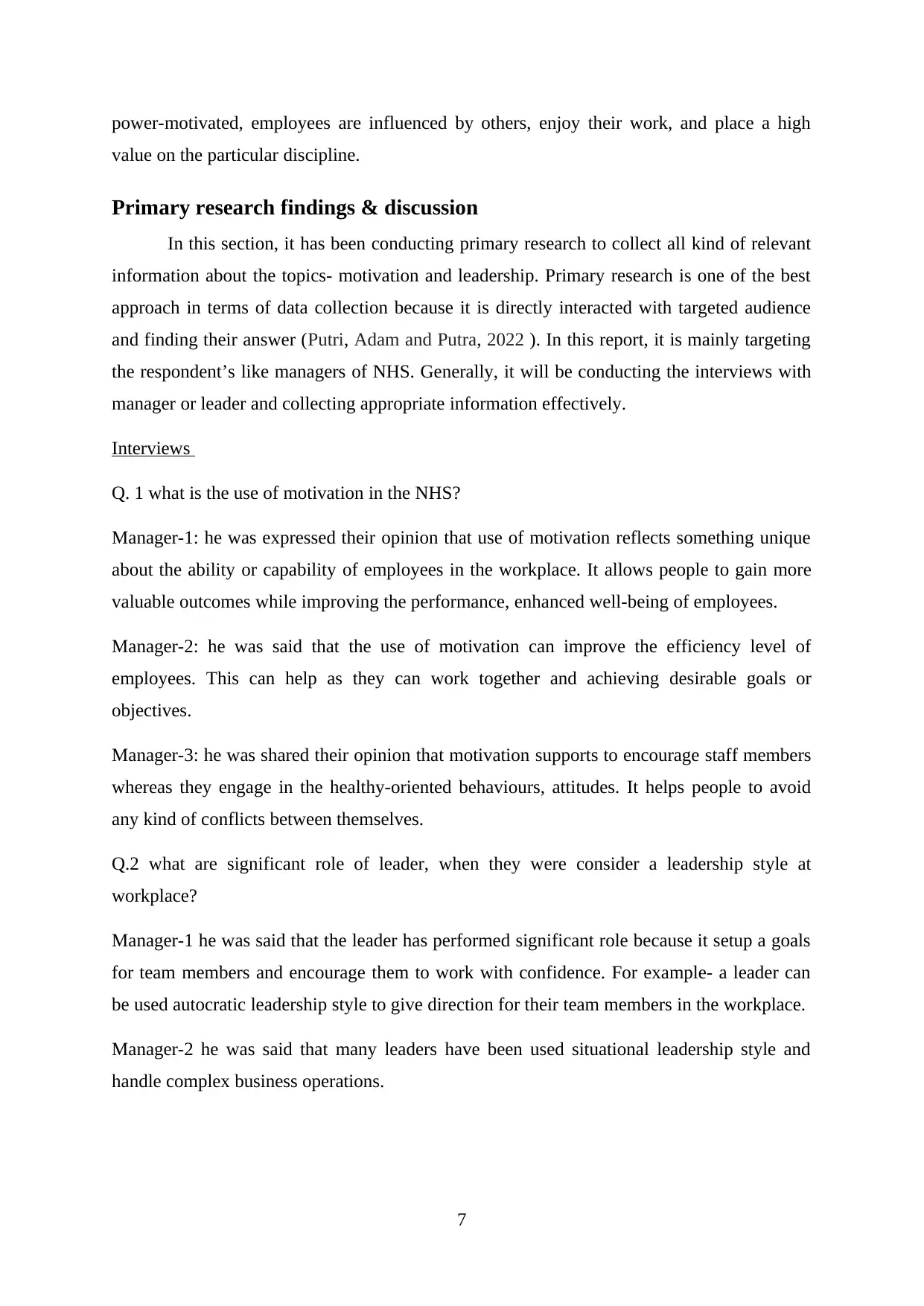
power-motivated, employees are influenced by others, enjoy their work, and place a high
value on the particular discipline.
Primary research findings & discussion
In this section, it has been conducting primary research to collect all kind of relevant
information about the topics- motivation and leadership. Primary research is one of the best
approach in terms of data collection because it is directly interacted with targeted audience
and finding their answer (Putri, Adam and Putra, 2022 ). In this report, it is mainly targeting
the respondent’s like managers of NHS. Generally, it will be conducting the interviews with
manager or leader and collecting appropriate information effectively.
Interviews
Q. 1 what is the use of motivation in the NHS?
Manager-1: he was expressed their opinion that use of motivation reflects something unique
about the ability or capability of employees in the workplace. It allows people to gain more
valuable outcomes while improving the performance, enhanced well-being of employees.
Manager-2: he was said that the use of motivation can improve the efficiency level of
employees. This can help as they can work together and achieving desirable goals or
objectives.
Manager-3: he was shared their opinion that motivation supports to encourage staff members
whereas they engage in the healthy-oriented behaviours, attitudes. It helps people to avoid
any kind of conflicts between themselves.
Q.2 what are significant role of leader, when they were consider a leadership style at
workplace?
Manager-1 he was said that the leader has performed significant role because it setup a goals
for team members and encourage them to work with confidence. For example- a leader can
be used autocratic leadership style to give direction for their team members in the workplace.
Manager-2 he was said that many leaders have been used situational leadership style and
handle complex business operations.
7
value on the particular discipline.
Primary research findings & discussion
In this section, it has been conducting primary research to collect all kind of relevant
information about the topics- motivation and leadership. Primary research is one of the best
approach in terms of data collection because it is directly interacted with targeted audience
and finding their answer (Putri, Adam and Putra, 2022 ). In this report, it is mainly targeting
the respondent’s like managers of NHS. Generally, it will be conducting the interviews with
manager or leader and collecting appropriate information effectively.
Interviews
Q. 1 what is the use of motivation in the NHS?
Manager-1: he was expressed their opinion that use of motivation reflects something unique
about the ability or capability of employees in the workplace. It allows people to gain more
valuable outcomes while improving the performance, enhanced well-being of employees.
Manager-2: he was said that the use of motivation can improve the efficiency level of
employees. This can help as they can work together and achieving desirable goals or
objectives.
Manager-3: he was shared their opinion that motivation supports to encourage staff members
whereas they engage in the healthy-oriented behaviours, attitudes. It helps people to avoid
any kind of conflicts between themselves.
Q.2 what are significant role of leader, when they were consider a leadership style at
workplace?
Manager-1 he was said that the leader has performed significant role because it setup a goals
for team members and encourage them to work with confidence. For example- a leader can
be used autocratic leadership style to give direction for their team members in the workplace.
Manager-2 he was said that many leaders have been used situational leadership style and
handle complex business operations.
7
Paraphrase This Document
Need a fresh take? Get an instant paraphrase of this document with our AI Paraphraser
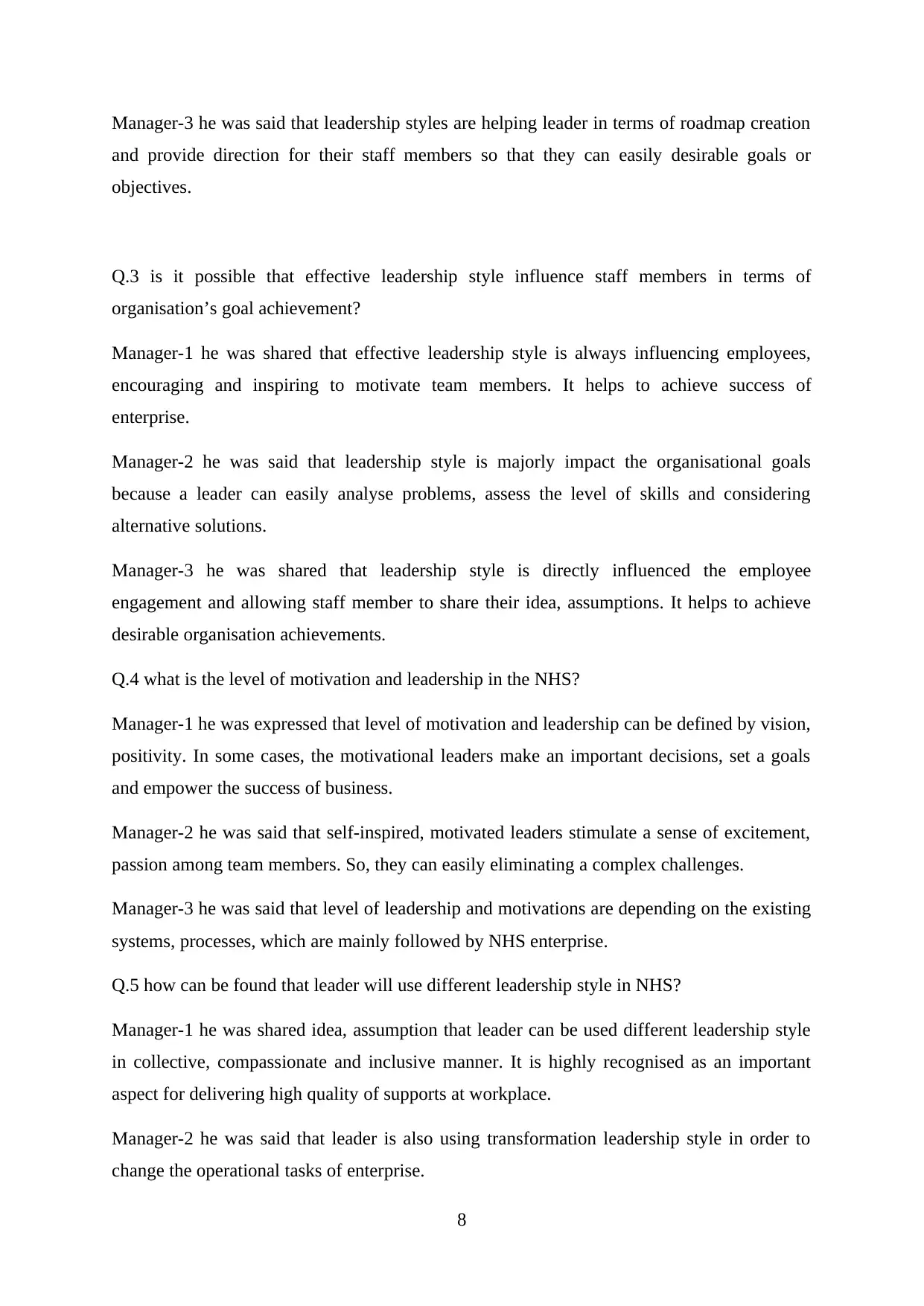
Manager-3 he was said that leadership styles are helping leader in terms of roadmap creation
and provide direction for their staff members so that they can easily desirable goals or
objectives.
Q.3 is it possible that effective leadership style influence staff members in terms of
organisation’s goal achievement?
Manager-1 he was shared that effective leadership style is always influencing employees,
encouraging and inspiring to motivate team members. It helps to achieve success of
enterprise.
Manager-2 he was said that leadership style is majorly impact the organisational goals
because a leader can easily analyse problems, assess the level of skills and considering
alternative solutions.
Manager-3 he was shared that leadership style is directly influenced the employee
engagement and allowing staff member to share their idea, assumptions. It helps to achieve
desirable organisation achievements.
Q.4 what is the level of motivation and leadership in the NHS?
Manager-1 he was expressed that level of motivation and leadership can be defined by vision,
positivity. In some cases, the motivational leaders make an important decisions, set a goals
and empower the success of business.
Manager-2 he was said that self-inspired, motivated leaders stimulate a sense of excitement,
passion among team members. So, they can easily eliminating a complex challenges.
Manager-3 he was said that level of leadership and motivations are depending on the existing
systems, processes, which are mainly followed by NHS enterprise.
Q.5 how can be found that leader will use different leadership style in NHS?
Manager-1 he was shared idea, assumption that leader can be used different leadership style
in collective, compassionate and inclusive manner. It is highly recognised as an important
aspect for delivering high quality of supports at workplace.
Manager-2 he was said that leader is also using transformation leadership style in order to
change the operational tasks of enterprise.
8
and provide direction for their staff members so that they can easily desirable goals or
objectives.
Q.3 is it possible that effective leadership style influence staff members in terms of
organisation’s goal achievement?
Manager-1 he was shared that effective leadership style is always influencing employees,
encouraging and inspiring to motivate team members. It helps to achieve success of
enterprise.
Manager-2 he was said that leadership style is majorly impact the organisational goals
because a leader can easily analyse problems, assess the level of skills and considering
alternative solutions.
Manager-3 he was shared that leadership style is directly influenced the employee
engagement and allowing staff member to share their idea, assumptions. It helps to achieve
desirable organisation achievements.
Q.4 what is the level of motivation and leadership in the NHS?
Manager-1 he was expressed that level of motivation and leadership can be defined by vision,
positivity. In some cases, the motivational leaders make an important decisions, set a goals
and empower the success of business.
Manager-2 he was said that self-inspired, motivated leaders stimulate a sense of excitement,
passion among team members. So, they can easily eliminating a complex challenges.
Manager-3 he was said that level of leadership and motivations are depending on the existing
systems, processes, which are mainly followed by NHS enterprise.
Q.5 how can be found that leader will use different leadership style in NHS?
Manager-1 he was shared idea, assumption that leader can be used different leadership style
in collective, compassionate and inclusive manner. It is highly recognised as an important
aspect for delivering high quality of supports at workplace.
Manager-2 he was said that leader is also using transformation leadership style in order to
change the operational tasks of enterprise.
8
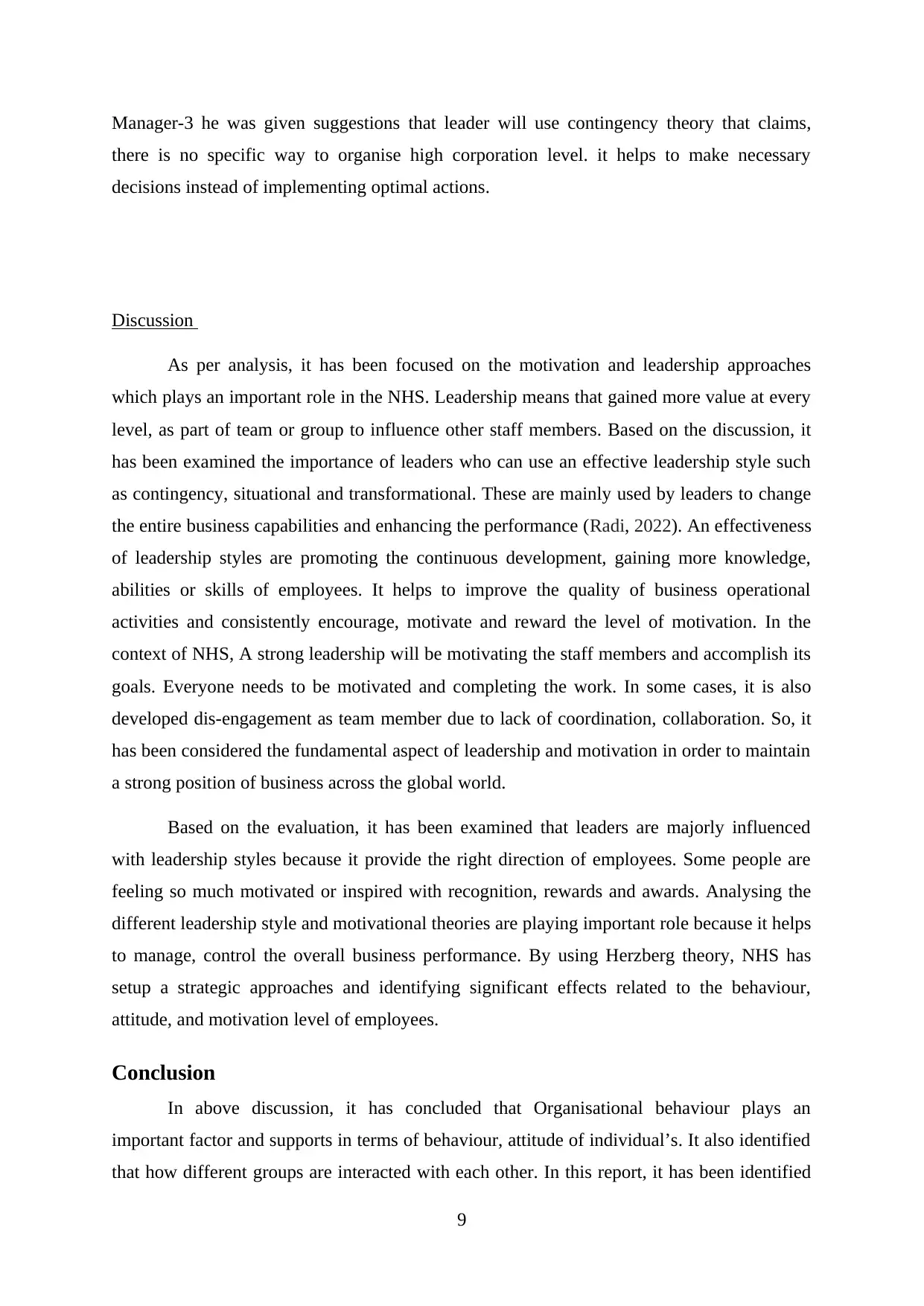
Manager-3 he was given suggestions that leader will use contingency theory that claims,
there is no specific way to organise high corporation level. it helps to make necessary
decisions instead of implementing optimal actions.
Discussion
As per analysis, it has been focused on the motivation and leadership approaches
which plays an important role in the NHS. Leadership means that gained more value at every
level, as part of team or group to influence other staff members. Based on the discussion, it
has been examined the importance of leaders who can use an effective leadership style such
as contingency, situational and transformational. These are mainly used by leaders to change
the entire business capabilities and enhancing the performance (Radi, 2022). An effectiveness
of leadership styles are promoting the continuous development, gaining more knowledge,
abilities or skills of employees. It helps to improve the quality of business operational
activities and consistently encourage, motivate and reward the level of motivation. In the
context of NHS, A strong leadership will be motivating the staff members and accomplish its
goals. Everyone needs to be motivated and completing the work. In some cases, it is also
developed dis-engagement as team member due to lack of coordination, collaboration. So, it
has been considered the fundamental aspect of leadership and motivation in order to maintain
a strong position of business across the global world.
Based on the evaluation, it has been examined that leaders are majorly influenced
with leadership styles because it provide the right direction of employees. Some people are
feeling so much motivated or inspired with recognition, rewards and awards. Analysing the
different leadership style and motivational theories are playing important role because it helps
to manage, control the overall business performance. By using Herzberg theory, NHS has
setup a strategic approaches and identifying significant effects related to the behaviour,
attitude, and motivation level of employees.
Conclusion
In above discussion, it has concluded that Organisational behaviour plays an
important factor and supports in terms of behaviour, attitude of individual’s. It also identified
that how different groups are interacted with each other. In this report, it has been identified
9
there is no specific way to organise high corporation level. it helps to make necessary
decisions instead of implementing optimal actions.
Discussion
As per analysis, it has been focused on the motivation and leadership approaches
which plays an important role in the NHS. Leadership means that gained more value at every
level, as part of team or group to influence other staff members. Based on the discussion, it
has been examined the importance of leaders who can use an effective leadership style such
as contingency, situational and transformational. These are mainly used by leaders to change
the entire business capabilities and enhancing the performance (Radi, 2022). An effectiveness
of leadership styles are promoting the continuous development, gaining more knowledge,
abilities or skills of employees. It helps to improve the quality of business operational
activities and consistently encourage, motivate and reward the level of motivation. In the
context of NHS, A strong leadership will be motivating the staff members and accomplish its
goals. Everyone needs to be motivated and completing the work. In some cases, it is also
developed dis-engagement as team member due to lack of coordination, collaboration. So, it
has been considered the fundamental aspect of leadership and motivation in order to maintain
a strong position of business across the global world.
Based on the evaluation, it has been examined that leaders are majorly influenced
with leadership styles because it provide the right direction of employees. Some people are
feeling so much motivated or inspired with recognition, rewards and awards. Analysing the
different leadership style and motivational theories are playing important role because it helps
to manage, control the overall business performance. By using Herzberg theory, NHS has
setup a strategic approaches and identifying significant effects related to the behaviour,
attitude, and motivation level of employees.
Conclusion
In above discussion, it has concluded that Organisational behaviour plays an
important factor and supports in terms of behaviour, attitude of individual’s. It also identified
that how different groups are interacted with each other. In this report, it has been identified
9
⊘ This is a preview!⊘
Do you want full access?
Subscribe today to unlock all pages.

Trusted by 1+ million students worldwide
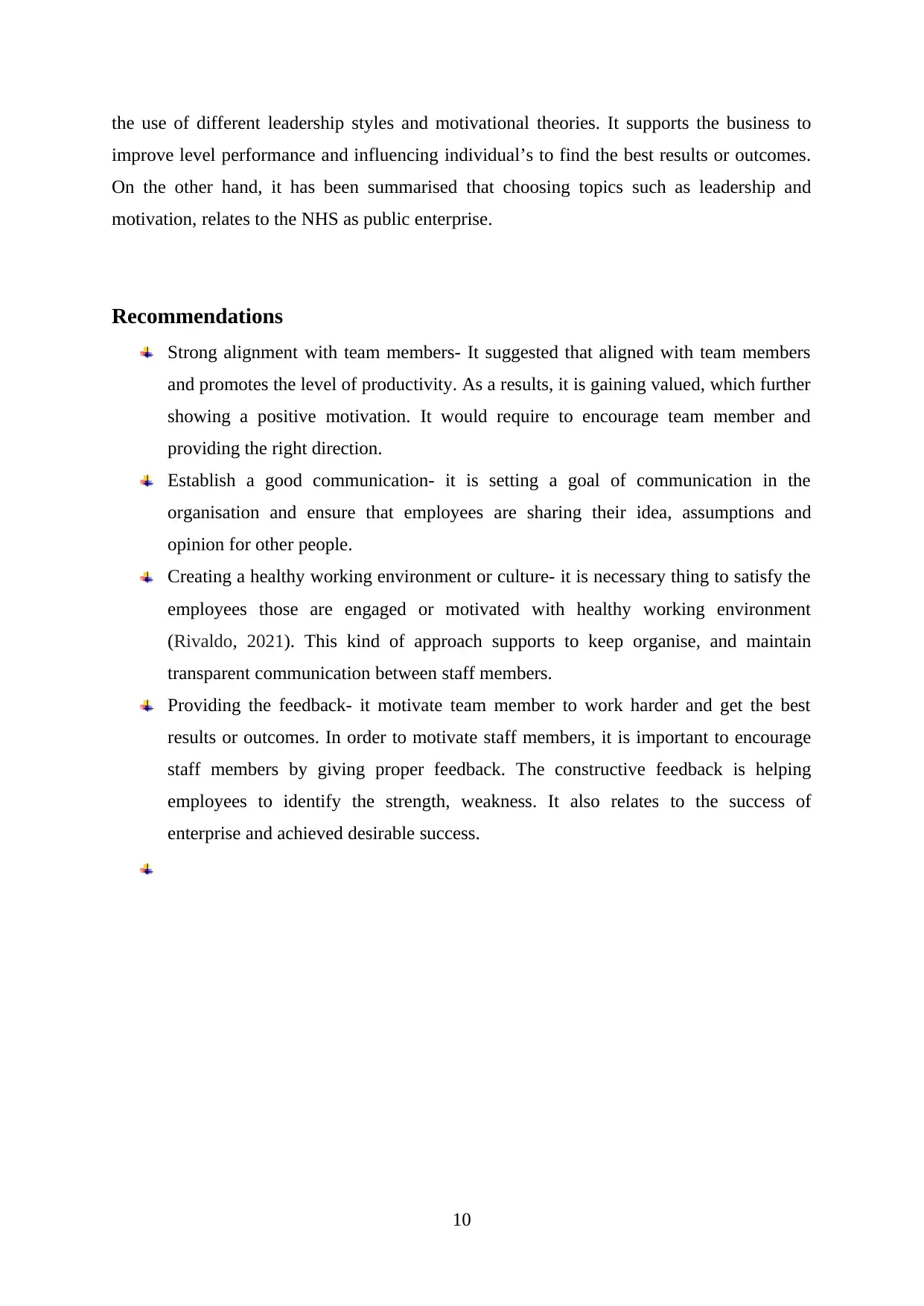
the use of different leadership styles and motivational theories. It supports the business to
improve level performance and influencing individual’s to find the best results or outcomes.
On the other hand, it has been summarised that choosing topics such as leadership and
motivation, relates to the NHS as public enterprise.
Recommendations
Strong alignment with team members- It suggested that aligned with team members
and promotes the level of productivity. As a results, it is gaining valued, which further
showing a positive motivation. It would require to encourage team member and
providing the right direction.
Establish a good communication- it is setting a goal of communication in the
organisation and ensure that employees are sharing their idea, assumptions and
opinion for other people.
Creating a healthy working environment or culture- it is necessary thing to satisfy the
employees those are engaged or motivated with healthy working environment
(Rivaldo, 2021). This kind of approach supports to keep organise, and maintain
transparent communication between staff members.
Providing the feedback- it motivate team member to work harder and get the best
results or outcomes. In order to motivate staff members, it is important to encourage
staff members by giving proper feedback. The constructive feedback is helping
employees to identify the strength, weakness. It also relates to the success of
enterprise and achieved desirable success.
10
improve level performance and influencing individual’s to find the best results or outcomes.
On the other hand, it has been summarised that choosing topics such as leadership and
motivation, relates to the NHS as public enterprise.
Recommendations
Strong alignment with team members- It suggested that aligned with team members
and promotes the level of productivity. As a results, it is gaining valued, which further
showing a positive motivation. It would require to encourage team member and
providing the right direction.
Establish a good communication- it is setting a goal of communication in the
organisation and ensure that employees are sharing their idea, assumptions and
opinion for other people.
Creating a healthy working environment or culture- it is necessary thing to satisfy the
employees those are engaged or motivated with healthy working environment
(Rivaldo, 2021). This kind of approach supports to keep organise, and maintain
transparent communication between staff members.
Providing the feedback- it motivate team member to work harder and get the best
results or outcomes. In order to motivate staff members, it is important to encourage
staff members by giving proper feedback. The constructive feedback is helping
employees to identify the strength, weakness. It also relates to the success of
enterprise and achieved desirable success.
10
Paraphrase This Document
Need a fresh take? Get an instant paraphrase of this document with our AI Paraphraser
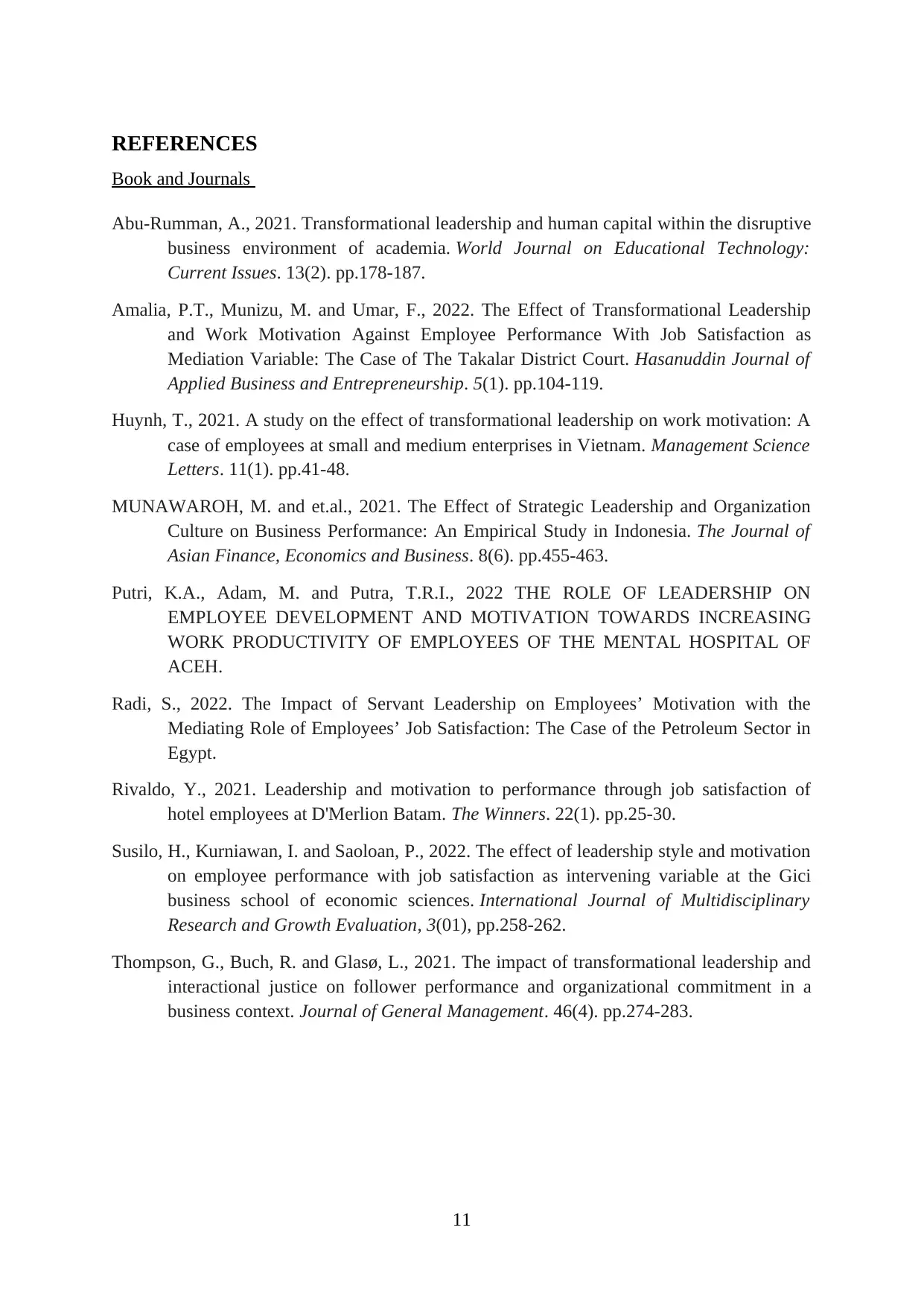
REFERENCES
Book and Journals
Abu-Rumman, A., 2021. Transformational leadership and human capital within the disruptive
business environment of academia. World Journal on Educational Technology:
Current Issues. 13(2). pp.178-187.
Amalia, P.T., Munizu, M. and Umar, F., 2022. The Effect of Transformational Leadership
and Work Motivation Against Employee Performance With Job Satisfaction as
Mediation Variable: The Case of The Takalar District Court. Hasanuddin Journal of
Applied Business and Entrepreneurship. 5(1). pp.104-119.
Huynh, T., 2021. A study on the effect of transformational leadership on work motivation: A
case of employees at small and medium enterprises in Vietnam. Management Science
Letters. 11(1). pp.41-48.
MUNAWAROH, M. and et.al., 2021. The Effect of Strategic Leadership and Organization
Culture on Business Performance: An Empirical Study in Indonesia. The Journal of
Asian Finance, Economics and Business. 8(6). pp.455-463.
Putri, K.A., Adam, M. and Putra, T.R.I., 2022 THE ROLE OF LEADERSHIP ON
EMPLOYEE DEVELOPMENT AND MOTIVATION TOWARDS INCREASING
WORK PRODUCTIVITY OF EMPLOYEES OF THE MENTAL HOSPITAL OF
ACEH.
Radi, S., 2022. The Impact of Servant Leadership on Employees’ Motivation with the
Mediating Role of Employees’ Job Satisfaction: The Case of the Petroleum Sector in
Egypt.
Rivaldo, Y., 2021. Leadership and motivation to performance through job satisfaction of
hotel employees at D'Merlion Batam. The Winners. 22(1). pp.25-30.
Susilo, H., Kurniawan, I. and Saoloan, P., 2022. The effect of leadership style and motivation
on employee performance with job satisfaction as intervening variable at the Gici
business school of economic sciences. International Journal of Multidisciplinary
Research and Growth Evaluation, 3(01), pp.258-262.
Thompson, G., Buch, R. and Glasø, L., 2021. The impact of transformational leadership and
interactional justice on follower performance and organizational commitment in a
business context. Journal of General Management. 46(4). pp.274-283.
11
Book and Journals
Abu-Rumman, A., 2021. Transformational leadership and human capital within the disruptive
business environment of academia. World Journal on Educational Technology:
Current Issues. 13(2). pp.178-187.
Amalia, P.T., Munizu, M. and Umar, F., 2022. The Effect of Transformational Leadership
and Work Motivation Against Employee Performance With Job Satisfaction as
Mediation Variable: The Case of The Takalar District Court. Hasanuddin Journal of
Applied Business and Entrepreneurship. 5(1). pp.104-119.
Huynh, T., 2021. A study on the effect of transformational leadership on work motivation: A
case of employees at small and medium enterprises in Vietnam. Management Science
Letters. 11(1). pp.41-48.
MUNAWAROH, M. and et.al., 2021. The Effect of Strategic Leadership and Organization
Culture on Business Performance: An Empirical Study in Indonesia. The Journal of
Asian Finance, Economics and Business. 8(6). pp.455-463.
Putri, K.A., Adam, M. and Putra, T.R.I., 2022 THE ROLE OF LEADERSHIP ON
EMPLOYEE DEVELOPMENT AND MOTIVATION TOWARDS INCREASING
WORK PRODUCTIVITY OF EMPLOYEES OF THE MENTAL HOSPITAL OF
ACEH.
Radi, S., 2022. The Impact of Servant Leadership on Employees’ Motivation with the
Mediating Role of Employees’ Job Satisfaction: The Case of the Petroleum Sector in
Egypt.
Rivaldo, Y., 2021. Leadership and motivation to performance through job satisfaction of
hotel employees at D'Merlion Batam. The Winners. 22(1). pp.25-30.
Susilo, H., Kurniawan, I. and Saoloan, P., 2022. The effect of leadership style and motivation
on employee performance with job satisfaction as intervening variable at the Gici
business school of economic sciences. International Journal of Multidisciplinary
Research and Growth Evaluation, 3(01), pp.258-262.
Thompson, G., Buch, R. and Glasø, L., 2021. The impact of transformational leadership and
interactional justice on follower performance and organizational commitment in a
business context. Journal of General Management. 46(4). pp.274-283.
11

12
⊘ This is a preview!⊘
Do you want full access?
Subscribe today to unlock all pages.

Trusted by 1+ million students worldwide

13
1 out of 13
Related Documents
Your All-in-One AI-Powered Toolkit for Academic Success.
+13062052269
info@desklib.com
Available 24*7 on WhatsApp / Email
![[object Object]](/_next/static/media/star-bottom.7253800d.svg)
Unlock your academic potential
© 2024 | Zucol Services PVT LTD | All rights reserved.




